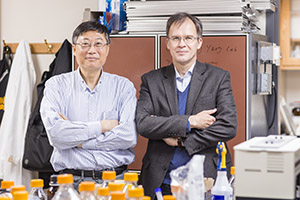A UWM faculty researcher has been awarded two federal grants, totaling $2.4 million, to further study of a compound he sourced from a bacterium that shows promise for controlling some crop diseases with the same efficacy as the human antibiotic.
Ching-Hong Yang, professor of biological sciences, found that a novel natural compound, RejuAgro A, made by the innocuous bacterium Pseudomonas soli T307 strain, offers an environmentally friendly approach to combatting microbial infections.
The goal, Yang said, is to offer farmers a safe and effective treatment for diseases that decimate crop yields without contributing to antibiotic resistance in people who eat the fruit.
Each of the grants will test RejuArgo use for a different crop disease – fire blight disease in apple trees and huanglongbing, known as “citrus greening,” in orange trees.
Apples and oranges
The U.S. Department of Agriculture awarded $1 million through its Organic Transit program to support testing of a dual-support strategy using RejuAgro A to control fire blight infection in apples.

The compound offers organic farmers a natural treatment to address fire blight infection where few alternatives exist.
RejuAgro A has demonstrated the same effectiveness as antibiotics against the pathogen responsible for fire blight. The researchers will now apply natural inducers to increase production of RejuArgo A by the bacterium, Pseudomonas soli T307 strain.
“Our research indicates that the compound not only combats the pathogen directly but also boosts the host trees’ immunity,” Yang said, “ensuring that the biocontrol agent performs consistently from year to year.”
The USDA’s National Institute of Food and Agriculture awarded the second grant of $1.4 million to help Yang further study the compound’s efficacy in lessening the severity of citrus greening and increasing orange crop yields. He will work with collaborators at the University of Florida.
Citrus greening is considered the greatest threat to the U.S. orange-growers because it is fatal to the infected trees and the only treatment available is the human antibiotic streptomycin, which underperforms.
Since the disease’s appearance in Florida in 2005, citrus production has plunged by 75%, according to the U.S. Department of Agriculture.
To commercialize RejuAgro, Yang launched a startup company, T3 Bioscience, with partner Daniel Burgin in 2018. T3 Bioscience holds the patent for the compound jointly with the UWM Research Foundation.






